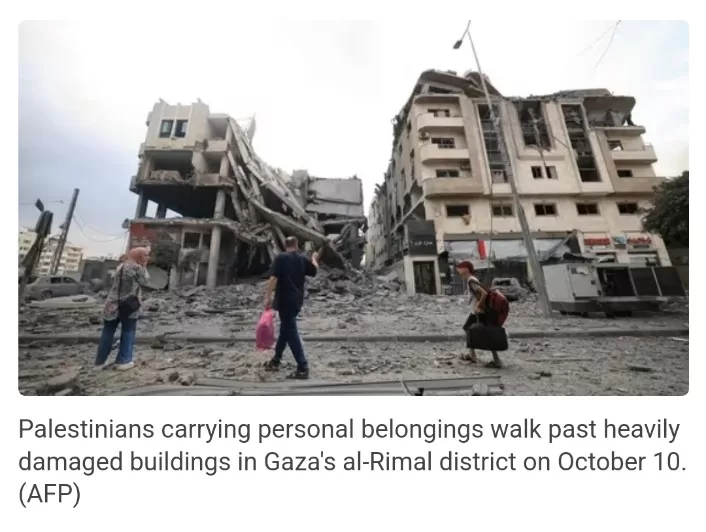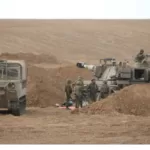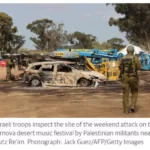Fear-stricken residents of Gaza have borne witness to relentless bombardments, with residential buildings, hospitals, and schools becoming unfortunate targets in the conflict, raising serious concerns about the devastation of civilian infrastructure. Israel’s commitment to imposing a full siege amplifies apprehensions.
Since Saturday, Palestinian health officials have reported the loss of over 900 lives, with 4,250 individuals wounded in the escalating violence.
Nidal Hamdouna, a dedicated humanitarian worker representing the Norwegian-Danish organization Church Aid, expressed his deep concern: “I believe this is the most serious escalation I will face. I was born here in Gaza, I witnessed the previous escalations.”
“The situation we are facing involves intensive airstrikes and shelling targeting different locations across the Gaza Strip, including my neighborhood. The issue is that there is no safe place to go to in Gaza right now,” he added.
“I witnessed the wars of 2008, 2014, and 2021, but this is something unique in terms of the intensity… entire families have been killed. The concern is to what extent civilians are protected, but also how to find a safe place, even though there is no safe place to go to.”
Gaza’s sole border crossing with Egypt, the only entry point not under Israeli control, has been struck by Israeli airstrikes three times in the past 24 hours, as reported by an Egyptian NGO.
The UN office for the coordination of humanitarian affairs (OCHA) has revealed that over 200,000 people have been displaced in Gaza, with that number expected to surge. Airstrikes have leveled 790 housing units and severely damaged 5,330 more.
The increasing number of wounded threatens to overwhelm Gaza’s fragile healthcare system, which has endured a 16-year blockade by Israeli authorities, limiting the influx of people, fuel, construction materials, and food.
Mahmoud Shalabi, a representative of the aid organization Medical Aid for Palestinians, shared the dire situation: “Beit Hanoun hospital in the north of Gaza has been out of service due to the collateral damage it received from bombardments around it. Also, roads around it were destroyed, making it inaccessible.”
Shalabi also highlighted the damage to Gaza’s largest hospital, Al Shifa in Gaza City, a crucial care center for the enclave’s residents, especially in times of crisis.
“The neonatal unit at Shifa hospital, the central trauma hospital and the largest in Gaza, was partly damaged due to bombardments around the facility,” he said.
“The roads around Al Shifa have been severely impacted, limiting access, and all hospitals are suffering greatly from the lack of supplies and personnel. Yesterday, the ministry of health called for all nurses in Gaza to begin volunteer work in the nearest hospital.”
UN Secretary-General António Guterres expressed his deep concern over reports of Israeli airstrikes and shelling targeting civilian infrastructure. He emphasized the importance of conducting military operations in strict accordance with international humanitarian law, where the protection of civilians is paramount, and civilian infrastructure must never be targeted.
Guterres previously expressed distress over Israel’s vow to enforce a “complete siege” of Gaza. This followed Israeli Defense Minister Yoav Gallant’s declaration that “no electricity, no food, no water, no fuel” would be allowed into the densely populated territory in response to an unprecedented incursion by Hamas militants into Israel, resulting in over 1,000 casualties – the deadliest militant attack in Israel’s history.
As the Israeli military calls up 300,000 reservists and fortifies the Gaza border with what they describe as an “iron wall” of tanks and helicopters in preparation for a large-scale ground invasion, the situation becomes increasingly alarming.
For Hamdouna, the magnitude of the crisis is undeniable: “This time it really is a catastrophe for the entire Gaza population – more than 2 million people are under fire and affected by this war and the escalation because of a full siege.”
“I believe this is a collective punishment for the entire Gaza population. Civilians are not safe, they can’t access their basic needs – water, food. The health sector is deteriorating under the number of injured people,” he emphasized.
The multi-faceted impact of the conflict is felt throughout daily life, from electricity shortages, severe limitations on water access, and difficulties in procuring food and supplies to challenges in communications and the ability to work remotely. The scale of this crisis is unprecedented, leaving the Gaza population in the grip of a severe catastrophe.
IDF spokesperson Lt. Col. Richard Hecht advises Palestinians to “get out” and escape airstrikes through the southern border crossing with Egypt, before clarifying that the crossing is now closed.




